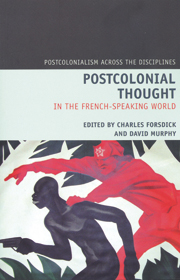Book contents
- Frontmatter
- Contents
- Acknowledgements
- Introduction: Situating Francophone Postcolonial Thought
- Section 1 Twelve Key Thinkers
- 1 Aimé Césaire and Francophone Postcolonial Thought
- 2 Maryse Condé: Post-Postcolonial?
- 3 Jacques Derrida: Colonialism, Philosophy and Autobiography
- 4 Assia Djebar: ‘Fiction as a way of “thinking”’
- 5 Frantz Fanon: Colonialism and Violence
- 6 Édouard Glissant: Dealing in Globality
- 7 Tangled History and Photographic (In)Visibility: Ho Chi Minh on the Edge of French Political Culture
- 8 Translating Plurality: Abdelkébir Khatibi and Postcolonial Writing in French from the Maghreb
- 9 Albert Memmi: The Conflict of Legacies
- 10 V. Y. Mudimbe's ‘Long Nineteenth Century’
- 11 Roads to Freedom: Jean-Paul Sartre and Anti-colonialism
- 12 Léopold Sédar Senghor: Race, Language, Empire
- Section 2 Themes, Approaches, Theories
- Notes on Contributors
- Bibliography
- Index
9 - Albert Memmi: The Conflict of Legacies
from Section 1 - Twelve Key Thinkers
- Frontmatter
- Contents
- Acknowledgements
- Introduction: Situating Francophone Postcolonial Thought
- Section 1 Twelve Key Thinkers
- 1 Aimé Césaire and Francophone Postcolonial Thought
- 2 Maryse Condé: Post-Postcolonial?
- 3 Jacques Derrida: Colonialism, Philosophy and Autobiography
- 4 Assia Djebar: ‘Fiction as a way of “thinking”’
- 5 Frantz Fanon: Colonialism and Violence
- 6 Édouard Glissant: Dealing in Globality
- 7 Tangled History and Photographic (In)Visibility: Ho Chi Minh on the Edge of French Political Culture
- 8 Translating Plurality: Abdelkébir Khatibi and Postcolonial Writing in French from the Maghreb
- 9 Albert Memmi: The Conflict of Legacies
- 10 V. Y. Mudimbe's ‘Long Nineteenth Century’
- 11 Roads to Freedom: Jean-Paul Sartre and Anti-colonialism
- 12 Léopold Sédar Senghor: Race, Language, Empire
- Section 2 Themes, Approaches, Theories
- Notes on Contributors
- Bibliography
- Index
Summary
The necessity of self-renewal is as obvious as the ambiguity involved. While the colonized's revolt is a clear attitude in itself, its contents may be muddled; for it is the result of an unclear situation – the colonial situation.
(Memmi, 2003 [1957]: 180)Since the publication of his first novel, The Pillar of Salt (1953), Albert Memmi has offered textual portraits that bring the discomforting perspective of his vécu [lived experience] to bear upon discourses, practices and legacies of domination. In particular, and not surprisingly, Memmi's name often appears alongside those of critics of colonization such as Aimé Césaire, Frantz Fanon and Jean-Paul Sartre (for discussion of these writers, see Chapters 1, 5 and 11 of this volume). Jean-Marc Moura provides a typical example of this when he writes that the work of Memmi, Césaire and Fanon constitute ‘les essais de combat’ [the essays of struggle] (2007 [1999]: 69) of Francophone anti-colonial writing. In terms of intellectual legacy, Robert Young argues that since ‘Sartre, Fanon and Memmi, postcolonial criticism has constructed two antithetical groups, the colonizer and colonized […], a false Manichean division that threatens to reproduce the static, essentialist categories it seeks to undo’ (1995a: 5). Yet even as Memmi's work is acknowledged, it is more often than not largely unread or summarily read. For though Memmi's work offers a trenchant critique of colonialism, far from constructing a simple binary opposition between colonizer and colonized it has consistently brought attention to the cultural imbrications that result from the colonial situation.
- Type
- Chapter
- Information
- Postcolonial Thought in the French Speaking World , pp. 126 - 135Publisher: Liverpool University PressPrint publication year: 2009

